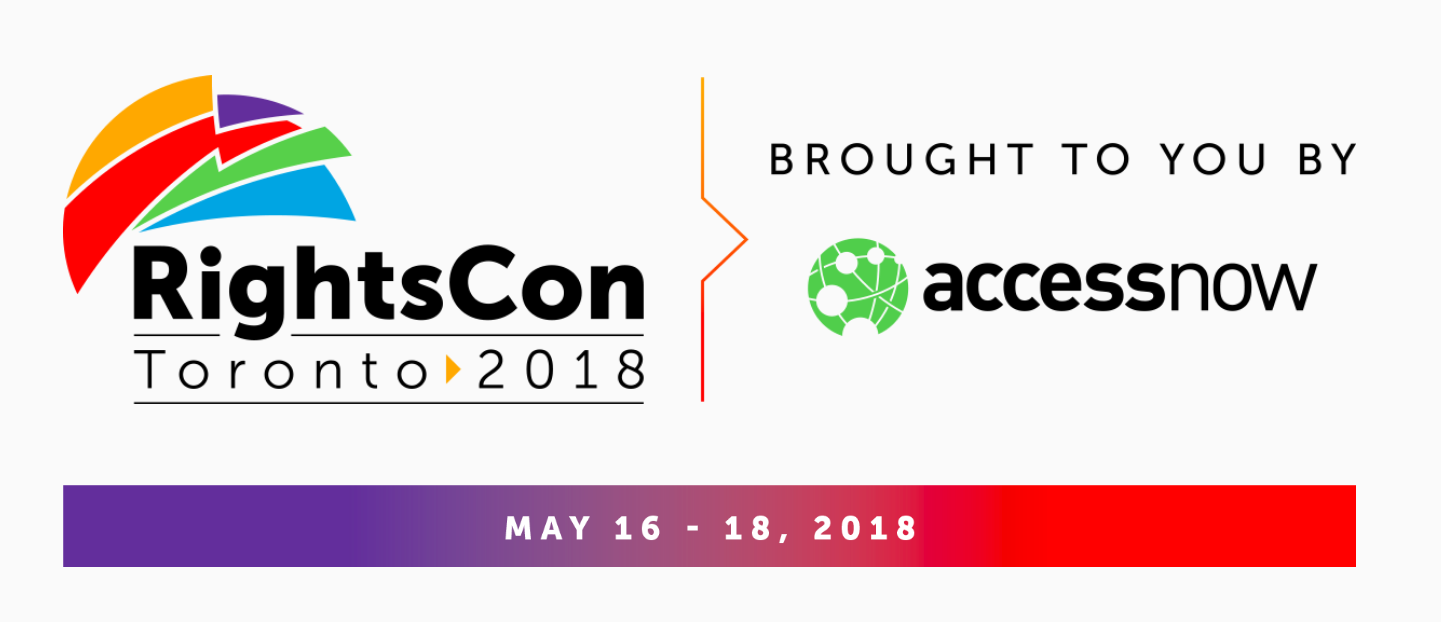OONI at RightsCon 2018
Maria Xynou
2018-05-11

We are excited to participate at
RightsCon next week: the world’s leading
event on human rights in the digital age. Annually hosted by Access Now, this three-day conference will take
place in Toronto between 16th-18th May 2018.
Over the last years, RightsCon has provided us the opportunity to
participate in critical discussions in the digital rights field, meet
many fascinating people and organizations, and to form new coalitions.
We therefore look forward to participating at RightsCon and are eager to
meet many new faces!
Below we list the sessions we’ll be speaking at and moderating. We hope
you can join us!
1 Enforcing Net Neutrality with Evidence Based Policy Making
Moderator: Georgia Bullen
Speakers: Simone Basso, Luca Belli, Amba Kak, J. Carlos Lara, Thomas
Lohninger, Eric Null, Javier Pallero, Maria Xynou
When: Wednesday, 16th May 2018, 10:30 - 11:45
Where: 204B
The goal of this session is to provide an understanding of the current
state of play in net neutrality in different countries and regions,
discuss challenges that panelists have encountered, provide insight into
the work of digital rights NGOs in making sure that the net neutrality
provisions are enforced, talk about how the public can continue to be
involved once net neutrality legislation is designed (e.g. submitting
complaints to regulators, bringing cases, public advocacy). In this
discussion, we hope to introduce more folks to tools that can be useful
in their policy and advocacy work, e.g. internet measurement data like
Measurement Lab, OONI and others. The discussion will cover how to think
about working with measurement tools as part of advocacy and campaigns
and overall be a conversation on strategic thinking with data in pursuit
of evidence based policy making.
2 Shedding Light on Internet Blackouts
Moderator: Maria Xynou
Speakers: Mishi Choudhary, Archippe Yepmou, Arturo Filastò
When: Wednesday, 16th May 2018, 14:30 - 15:45
Where: 201B
An Internet blackout happens when the connectivity of a particular
region or even a whole country is completely disrupted.
This panel will bring together the technical and social perspectives of
this phenomenon. We will be explaining how we can gain a technical
understanding of how internet blackouts happen, why they happen through
a contextual analysis and who are most affected by them. Some of the
panelists have first person experience dealing with and responding to
internet blackouts, while others are working on developing a technically
sound methodology for measuring blackouts when they occur.
We will give an overview of the state of the art and present some of the
findings from the past years.
3 Defending Minority Voices on a Censored Internet
Moderator: Jessica Anderson
Speakers: Nadim Nashef, Japleen Pasricha, Maria Xynou
When: Thursday, 17th May 2018, 16:00 - 17:00
Where: 205B
Minority groups and marginalized communities often experience distinct
patterns of censorship online. This censorship occurs at multiple
levels, from the blocking of minority websites to platform censorship.
This session will present evidence of online censorship of minority
groups and will engage participants to consider what can be done to
safeguard digital freedom of expression rights for oppressed
communities.
Visualizing Impact will discuss efforts through Onlinecensorship.org
team to capture reports of censorship by social media platforms. OONI
will also discuss cases involving the blocking of minority websites
around the world, as well as techniques for measuring their
accessibility over time.
4 When Repressive Authorities #KeepItOn
Moderator: Arturo Filastò
Speakers: Arzu Geybullayeva, Arthur Gwagwa, Grace Mutung’u, Alp
Toker, Maria Xynou
When: Thursday, 17th May 2018, 17:15 - 18:15
Where: 204A
The session will debunk the notion that the internet needs to be
“controlled” to be safe. This session therefore seeks to develop a
stronger analytical and conceptual understanding of the strategies being
pursued by the set of leading authoritarian powers in Africa and
globally in controlling information online; to assess the nature of the
challenge this presents to the Internet Freedom Community; and to
determine what opportunities may be available to digital rights
activists within these countries—and to those outside seeking to support
them—that have not been adequately explored or exploited. It will also
equip advocacy strategists with solid facts to lead the global fight
against censorship and disruption of networks, information, and
communication by presenting an opportunity to discuss other emerging
trends in surveillance and censorship, such as new forms of surveillance
by police officers and intelligence services such as social media
intelligence (SOCMINT) and offer recommendations.